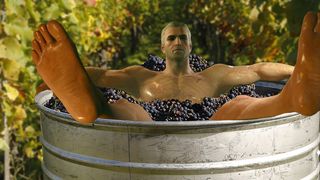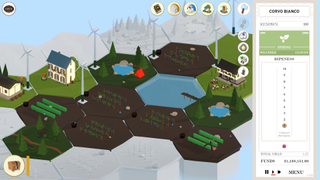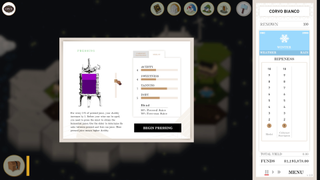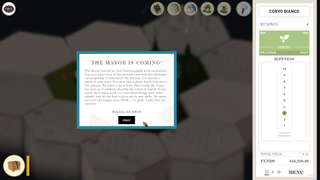We roleplayed Geralt of Rivia in this winery tycoon game
Indie sim Terroir lets you manage a vineyard and winery. We thought a retired Witcher would fit right in.

Retiring wasn’t easy. Eventually I had to put my swords in the display case. Folk expect an old man in Toussaint to care about wine, so that’s what I did. I asked the majordomo for help, and he handed me a ledger: Terroir. Well. I’ve been brewing potions and oils for this many years—making wine can’t be that hard. I just have to get on with it.
Year 1
The majordomo taught me the basics, but he was happy to leave me to learn on my own. The first harvest was a mess. Few grapes were worth using. According to the ledger, pretty much any grape can make wine. The resulting batch is… red. It’s wine. I’m pretty sure.
After I bottle it, a few local drunks give it "FIVE PLOUGHING STARS," which I cautiously take as a compliment. I plant more vines with the extra money. The truth is, it’s an easier way to earn coin than punching an angry cyclops. Maybe retirement is going to be OK after all.
Year 3
Grapes are fickle: they need a little rain to get going, then they grow best with warm sun and cloudy days. Too much rain and the vines grow leafy and and starve the grapes, blocking the sun even when the weather is good. Not enough rain, and the leafless vines sit exposed to sun, getting scorched and turning too sweet.
This summer was dry and the grapes ripened too early. I thought about praying for rain, but I’ve never been on good terms with the gods. Long ago, I saw a Skellige druid perform a rain summoning ritual, but the majordomo said that kind of thing would upset the neighbors.
The biggest gaming news, reviews and hardware deals
Keep up to date with the most important stories and the best deals, as picked by the PC Gamer team.

Rain finally came, and the green leaves gave the grapes enough shade to calm down. Slowly, the last of the grapes finally ripened, but the first hints of frost were only days away when I called the workers in for harvest. We made it, but it was a close thing.
Maybe it was beginner’s luck, or maybe it’s just easy to impress dockside drunks, but the local judges haven’t liked my wines from the last few years. They keep coming back with the same problem: the acidity is too low.
Year 4
Constant, dreary rain. Like being back in Velen, hip-deep in mud and foglets. The workers in the fields trimmed leaves in a downpour, but new leaves came back as fast as they could cut them. I thought about reaching for a sword and helping cut back the foliage, but Yen thought someone would end up losing a hand. She’s usually right.
It doesn’t really matter, since the rain never stopped. We trimmed leaves from early spring to late autumn, then let the small, bitter grapes die on the vine without harvesting a single one.
Year 7
Making wine is a process. The first step is to stomp the grapes into juice, which pulls out tannins, the stuff that makes red wine bitter and caustic—like Vesemir always was before breakfast. After crushing, we ferment juice and grape pulp, which trades the sweetness for alcohol. Then, some of the fermented pulp gets pressed to add more acidic juice to the wine.
The workers taste the wine throughout, looking for acid, sweetness, and tannins. Getting a good balance between these qualities takes trial and error. The majordomo, for all his good qualities, isn’t interested in keeping track of the combinations we try out. I started keeping a notebook at my desk, writing down combinations. This year’s batch will be Acid: 5; Sweetness: 3; Tannins: 4. I scratch out 5/3/4 in my notebook to remember for next year. Last year we tried 4/3/4. It was good, but again the locals thought the acid was too low.
In time, we’ll be able to afford better barrels that age wine to perfection and a big grinder that pulls more tannins out of the grapes. They seem like luxuries, but those things will help us hit recipes no matter what happens with the harvest. For now, we can only do what we can with the grapes the weather gives us. Sometimes it’s good wine, sometimes it’s bad, but booze will always sell.

Year 9
I got a note from the mayor that he’d like to visit the estate. The weather was perfect this year, so I thought we’d have wine worth showing off. Sales are fine and the weather has been good enough, but another powerful local friend would be worth the trouble—even if it meant an evening wearing tights. After the harvest, we invited the mayor to share a bottle. He loved it, and offered a hefty sack of coin as a "government grant," wink wink.
Year 12
War looms, but for once I’m not marching off to join in the mess. A stressed-out Nilfgaardian quartermaster visited the estate, asking us to donate wine to the army. Local wine distributors in Toussaint are picky—we have to be careful to send them really good wine and sell bad batches to the peasants—but the quartermaster insisted that any purple alcohol will do.
The quartermaster’s timing is good. Instead of letting this year’s overripe, sunburned grapes go to waste, we turn them into the most disgusting toilet water ever to be bottled in Toussaint. I send 3,000 bottles of the Corvo Bianco Moehoen Special 1287—named for the Nilfgaardians’ prick of a Field Marshal—to the Black Ones with my insincerest compliments.

Year 15
For years, our wines were bottled and sold year by year, with a few special cases set aside for a few years down the line. The workers just finished rolling in the new aging barrels—made of “white oak” from a far-off land, “America”—and now wine becomes a long game. Planning ahead and aging wines to be bottled five, ten, or thirty years in the future is strange for an old man who expected to die young by the sword. Most times, I made my choice and never looked back. Now, I worry. It’s a new thing.
I’ve spent all this time expanding the vineyard and perfecting one type of wine, but some nearby soil might be good for different types of grapes: merlot, chardonnay, pinot noir. I’ve only just started to fill in the bestiary for my new world.
Micromanaging the vineyard workers is still a pain in the ass, and the majordomo still isn’t interested in keeping track of important details, so my notebook has grown thick and dog-eared. Still, watching the years roll by over these lovely hills with a glass of wine in-hand—well, life could be worse. It pretty much always was.
Year 20
We won an award today. Finally nailed down the perfect recipe, and last year’s batch got happy reviews from the royal court. I set aside some for this year’s local wine awards, and the Corvo Bianco Red 1295 was named the best in all of Toussaint. People are offering absurd prices for the remaining bottles, so I’m releasing them a dozen at a time to help the 1295 grow into legend. Dandelion isn't the only one who can build a myth when he wants to.
Corvio Bianco now has its own tavern where I can sell wine directly, and a few years of good harvests have filled my pockets and spread our reputation. Not bad for an abandoned boy raised on the stone floor of Kaer Morhen. Not bad at all.
Written by Ian Birnbaum.
Most Popular

